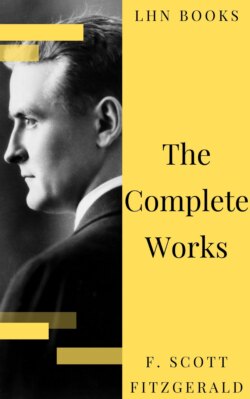Читать книгу The Complete Works of F. Scott Fitzgerald - F. Scott Fitzgerald - Страница 58
На сайте Литреса книга снята с продажи.
Financial.
ОглавлениеHis father died quietly and inconspicuously at Thanksgiving. The incongruity of death with either the beauties of Lake Geneva or with his mother’s dignified, reticent attitude diverted him, and he looked at the funeral with an amused tolerance. He decided that burial was after all preferable to cremation, and he smiled at his old boyhood choice, slow oxidation in the top of a tree. The day after the ceremony he was amusing himself in the great library by sinking back on a couch in graceful mortuary attitudes, trying to determine whether he would, when his day came, be found with his arms crossed piously over his chest (Monsignor Darcy had once advocated this posture as being the most distinguished), or with his hands clasped behind his head, a more pagan and Byronic attitude.
What interested him much more than the final departure of his father from things mundane was a tri-cornered conversation between Beatrice, Mr. Barton, of Barton and Krogman, their lawyers, and himself, that took place several days after the funeral. For the first time he came into actual cognizance of the family finances, and realized what a tidy fortune had once been under his father’s management. He took a ledger labelled “1906” and ran through it rather carefully. The total expenditure that year had come to something over one hundred and ten thousand dollars. Forty thousand of this had been Beatrice’s own income, and there had been no attempt to account for it: it was all under the heading, “Drafts, checks, and letters of credit forwarded to Beatrice Blaine.” The dispersal of the rest was rather minutely itemized: the taxes and improvements on the Lake Geneva estate had come to almost nine thousand dollars; the general up-keep, including Beatrice’s electric and a French car, bought that year, was over thirty-five thousand dollars. The rest was fully taken care of, and there were invariably items which failed to balance on the right side of the ledger.
In the volume for 1912 Amory was shocked to discover the decrease in the number of bond holdings and the great drop in the income. In the case of Beatrice’s money this was not so pronounced, but it was obvious that his father had devoted the previous year to several unfortunate gambles in oil. Very little of the oil had been burned, but Stephen Blaine had been rather badly singed. The next year and the next and the next showed similar decreases, and Beatrice had for the first time begun using her own money for keeping up the house. Yet her doctor’s bill for 1913 had been over nine thousand dollars.
About the exact state of things Mr. Barton was quite vague and confused. There had been recent investments, the outcome of which was for the present problematical, and he had an idea there were further speculations and exchanges concerning which he had not been consulted.
It was not for several months that Beatrice wrote Amory the full situation. The entire residue of the Blaine and O’Hara fortunes consisted of the place at Lake Geneva and approximately a half million dollars, invested now in fairly conservative six-per-cent holdings. In fact, Beatrice wrote that she was putting the money into railroad and street-car bonds as fast as she could conveniently transfer it.
“I am quite sure,” she wrote to Amory, “that if there is one thing we can be positive of, it is that people will not stay in one place. This Ford person has certainly made the most of that idea. So I am instructing Mr. Barton to specialize on such things as Northern Pacific and these Rapid Transit Companies, as they call the street-cars. I shall never forgive myself for not buying Bethlehem Steel. I’ve heard the most fascinating stories. You must go into finance, Amory. I’m sure you would revel in it. You start as a messenger or a teller, I believe, and from that you go up—almost indefinitely. I’m sure if I were a man I’d love the handling of money; it has become quite a senile passion with me. Before I get any farther I want to discuss something. A Mrs. Bispam, an overcordial little lady whom I met at a tea the other day, told me that her son, he is at Yale, wrote her that all the boys there wore their summer underwear all during the winter, and also went about with their heads wet and in low shoes on the coldest days. Now, Amory, I don’t know whether that is a fad at Princeton too, but I don’t want you to be so foolish. It not only inclines a young man to pneumonia and infantile paralysis, but to all forms of lung trouble, to which you are particularly inclined. You cannot experiment with your health. I have found that out. I will not make myself ridiculous as some mothers no doubt do, by insisting that you wear overshoes, though I remember one Christmas you wore them around constantly without a single buckle latched, making such a curious swishing sound, and you refused to buckle them because it was not the thing to do. The very next Christmas you would not wear even rubbers, though I begged you. You are nearly twenty years old now, dear, and I can’t be with you constantly to find whether you are doing the sensible thing.
“This has been a very practical letter. I warned you in my last that the lack of money to do the things one wants to makes one quite prosy and domestic, but there is still plenty for everything if we are not too extravagant. Take care of yourself, my dear boy, and do try to write at least once a week, because I imagine all sorts of horrible things if I don’t hear from you.
Affectionately,
Mother.”
